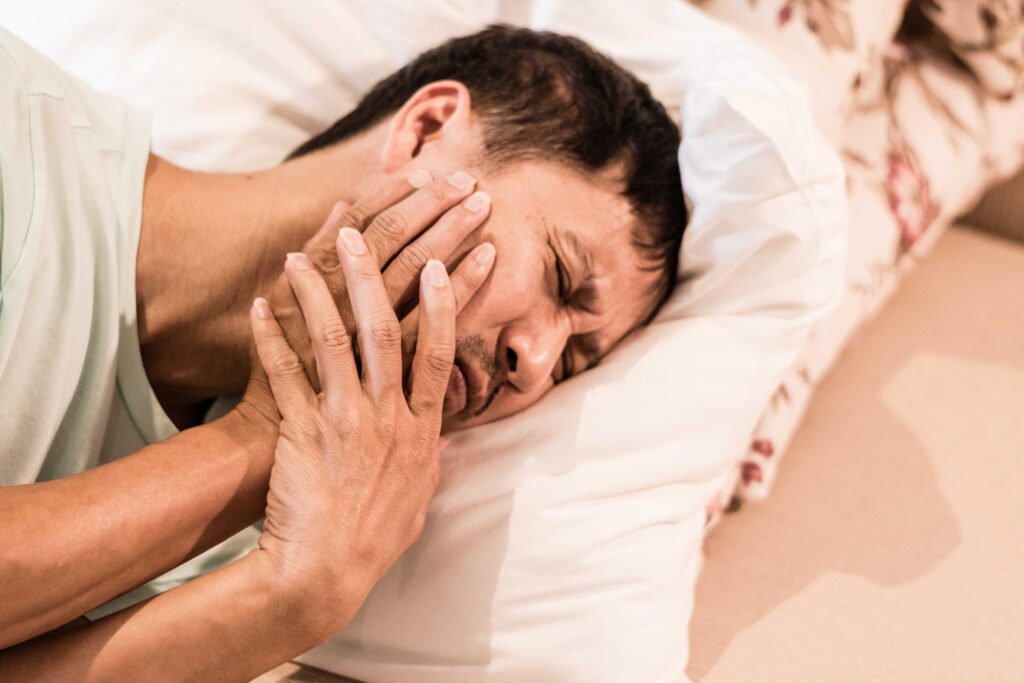
Dentists and dental sleep medicine specialists have seen throughout the pandemic how COVID-19 causes stress and inflammation that negatively impact dental patients’ health. According to recent research, COVID-19 patients have exhibited a host of symptoms known to affect oral health, including:1
- Dry mouth
- Mucosal blistering
- Mouth rashes
- Lip necrosis
Additionally, patients with existing periodontal disease have been found more likely to experience worsened COVID-19 symptoms.2 Altogether, these findings indicate that patients diagnosed with sleep-related breathing disorders (SRBDs) like obstructive sleep apnea (OSA) face an increased risk of complications from COVID-19.
Poor dental health has repeatedly been identified as a contributor to chronic health conditions such as cardiovascular and metabolic disease.3 As such, dentists and dental sleep medicine specialists need to consider how contracting COVID-19 affects patients’ short- and long-term health outcomes–especially in light of the discovery of “COVID clenching.”
What is “COVID clenching”?
Dental practices and organizations like the American Dental Association (ADA) have reported a notable rise in stress-related oral health conditions over the course of the pandemic. According to a September 2020 ADA survey:4
- 59.4% of surveyed dentists indicated an increased prevalence of bruxism among their patients.
- 53.4% reported an increase in chipped and cracked teeth.
- 53.% reported an increase in temporomandibular joint (TMJ) disorder symptoms.
And these numbers only increased as the pandemic continued. When the ADA surveyed American dentists again in 2021, over 70% of dentists reported: “seeing an increase of patients experiencing teeth grinding and clenching, conditions often associated with stress.”5
Researchers have linked the reported risk of bruxism cases–as well as related conditions such as chipped or cracked teeth and TMJ disorders–specifically to COVID-induced stress.6
According to the American Academy of Sleep Medicine (AASM), sleep-related bruxism is often caused when patients’ jaw muscles have strong, repeated contractions at night.7 Dental healthcare providers and researchers have indicated that “COVID clenching” is responsible for such contractions.
Not only has this trend correlated with a rise in orofacial pain among patients, but the damage bruxism does to patients’ teeth and jaws can also cause significant health issues for patients at risk for or currently diagnosed with OSA and other SRBDs.
How does bruxism impact oral health and sleep?
Bruxism–grinding or clenching one’s teeth–can cause or exacerbate a variety of long-term dental health issues, from oral and facial pain to enamel erosion and tooth damage. While having one’s jaw contract during sleep is common, stress–whether mental or physical–can cause muscle contractions that are strong enough to wear down patients’ teeth.
On their own, increased damage to tooth enamel and repetitive strain on patients’ TMJs are harmful enough. However, these symptoms–in particular sleep-related bruxism–have been shown to worsen mild to moderate OSA,8 likely by contributing to airway restriction, in turn impacting patients’ long-term health outcomes.
OSA patients, especially those with moderate to severe cases, are at increased risk for several other chronic health conditions. In addition to experiencing potentially debilitating daytime sleepiness and mental and physical fatigue, OSA patients are at increased risk of developing:9
- Cardiovascular disease
- Hypertension
- Type 2 diabetes
- Cognitive impairment
- Dementia
- Depression
- Mood or anxiety disorders
These conditions threaten the longevity and quality of patients’ lives. As a result, dentists and dental sleep medicine specialists should anticipate and address how COVID-related bruxism and TMJ disorders affect their patients.
How can dental sleep medicine address “COVID clenching”?
According to research in the Journal of Clinical Medicine, patients in two countries reported an increase in night-time teeth grinding from about 10% to 36%. Based on that and reports from the ADA, “COVID clenching” and the resultant health outcomes are clearly affecting a wide range of patients.
Dental healthcare providers need to be prepared to identify bruxism induced by COVID-related stress and take steps to prevent further damage to patients’ oral health and sleep conditions like OSA. Compared to other healthcare providers that OSA patients may see, dentists are uniquely positioned, trained, and qualified to administer airway and OSA screening during routine oral examinations.9
With the apparent impacts of “COVID clenching”, patients need dental healthcare providers that are prepared to promptly diagnose and treat COVID-related bruxism and prevent future health complications. By incorporating OSA screenings and treatment options like oral appliance therapy into their practice, dental healthcare providers can better identify and meet the needs of their patients during the COVID-19 pandemic.
Itamar Medical is a global medical device company specializing in sleep apnea diagnosis & management with the WatchPAT home sleep apnea test (HSAT).
References:
- Coke CJ, Davison B, Fields N, et al. SARS-CoV-2 Infection and Oral Health: Therapeutic Opportunities and Challenges. J Clin Med. 2021;10(1):156. doi:10.3390/jcm10010156
- Kamel A, Basuoni A, Salem, Z. et al. The Impact of Oral Health Status on COVID-19 Severity, Recovery Period and C-reactive Protein Values. Br Dent J. 2021. https://doi.org/10.1038/s41415-021-2656-1
- Yamazaki, Y, Morita T, Nakai K. et al. Impact of Dental Health Intervention on Cardiovascular Metabolic Risk: A Pilot Study of Japanese Adults. J Hum Hypertens. 2021. https://doi.org/10.1038/s41371-021-00551-2
- Versaci MB. HPI Poll: Dentists See Increase in Patients’ Stress-related Oral Health Conditions. American Dental Association. Sept 2020. https://www.ada.org/en/publications/ada-news/2020-archive/september/hpi-poll-dentists-see-increase-in-patients-stress-related-oral-health-conditions
- New Survey Finds Stress-Related Dental Conditions Continue to Increase. American Dental Assocation. March 2021. https://www.ada.org/en/press-room/news-releases/2021-archives/march/new-survey-finds-stress-related-dental-conditions-continue-to-increase
- Emodi-Periman A, Eli I, Smardz J, et al. Temporomandibular Disorder and Burxism Outbreak as a Possible Factor of Orofacial Pain Worsening During the COVID-19 Pandemic–Concomitant Research in Two Countries. J. Clin. Med., 2020, 9(10), 3250. https://doi.org/10.3390/jcm9103250
- Bruxism. Sleep Education–American Academy of Sleep Medicine. Aug. 2020. https://sleepeducation.org/sleep-disorders/bruxism/
- Martynowicz, H., Gac, P., Brzecka, A., Poreba, R., Wojakowska, A., Mazur, G., Smardz, J., & Wieckiewicz, M. (2019). The Relationship between Sleep Bruxism and Obstructive Sleep Apnea Based on Polysomnographic Findings. Journal of clinical medicine, 8(10), 1653. https://doi.org/10.3390/jcm8101653
- Sleep Apnea (Obstructive). American Dental Association. Accessed Sept 3, 2021. https://www.ada.org/en/member-center/oral-health-topics/sleep-apnea-obstructive
